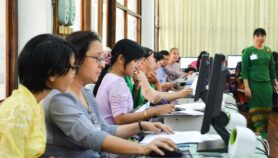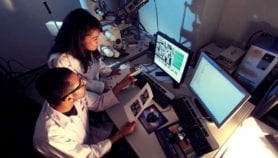Send to a friend
The details you provide on this page will not be used to send unsolicited email, and will not be sold to a 3rd party. See privacy policy.
A new commission set up by China to monitor scientific malpractice should look beyond the acts of individuals to the way that the country’s science is run.
For almost 25 years — from the early 1930s to the mid 1950s — much of biology in the Soviet Union was dominated by one man, the agronomist Trofim Lysenko. The apparent success of Lysenko in producing agricultural miracles, such as crops able to grow in temperatures far lower than their normal environment, gave him national hero status and wide-ranging powers. But his experiments lacked a genuine scientific basis and he used his power to silence his critics, both of which crippled Soviet genetics research for decades.
There are some disturbing echoes of the Lysenko story in a series of fraud cases that have emerged recently in China. No one is suggesting that the situation in China is anywhere near as bad as it was in the Soviet Union. Indeed, last week’s announcement that China’s Ministry of Education will create a special commission to monitor fraud and plagiarism shows that the Chinese authorities are taking the issue seriously.
But the commission faces the problem that, as with Lysenko, many of China’s fraud cases appear to stem from the inherent pressures that are built into the dynamics of Chinese science. Fraudulent activity is therefore unlikely to disappear until deep-seated processes — ranging from the reward structure to monitoring mechanisms — have been appropriately modified.
Pressure of rewards?
Take the reward structure for instance. In Lysenko’s case, it is clear that he was partly motivated by a thirst for power. This was offered by Soviet leader Joseph Stalin — with the backing of a grateful Russian people — as a reward for appearing to resolve the country’s food problems. Although lacking virtually any traditional scientific credentials, Lysenko was put in charge of the Academy of Agricultural Sciences of the Soviet Union and given the task of preventing the propagation of ‘harmful’ ideas among Soviet scientists.
In contrast, China’s problems seem to be partly founded on the substantial financial, rather than political, rewards that academic success can bring. Earlier this month, the claim made by Chen Jin of Shanghai Jiaotong University to have developed an entirely new microchip was found to be completely fictitious. He had been offered a substantial sum to return to China from the United States and was then awarded a large grant to continue his work.
Lower down the scale, successful results can raise scientists’ professional status — and thus their power within the academic community — an important incentive to succeed. Chinese scientists who publish research in internationally famous journals often earn several times more than their colleagues whose work is less prominent.
China is not alone in rewarding researchers with impressive publications records; these are used worldwide as a measure of professional success. But few countries have pursued this with as much zeal as China, which has committed to increasing scientific productivity at a rate that would be unimaginable in the West.
Fang Zhouzi, a biochemist turned columnist who runs the popular New Threads website feels that many ethical corners are being cut as researchers strive to achieve the ambitious targets they have been set. New Threads has identified more than 500 cases of academic misconduct in China (see Out to debunk: China’s ‘science police’).
Internal power structure
When it works, payment by results can be an effective way to stimulate good quality science. But there must be a mechanism in place to ensure that the results are as solid as they claim to be. And this is where the second dimension of the problem comes in, namely the formal and informal monitoring systems intended to ensure scientific quality.
One complaint frequently heard in China in recent months is that researchers are afraid to criticise the behaviour of colleagues they suspect of misconduct because it would mean challenging the individuals and institutions that have already declared the results valid. Those under suspicion can also wield supreme power over their potential accusers, or be in charge of allocating funding to their projects or institutions.
An article in the Christian Science Monitor this month, for example, quoted a Chinese researcher as complaining that journal editors were sometimes appointed on the basis of their seniority rather than their ability.
To make matters worse, officials often have the biggest say in deciding new or renewed research funding, and in deciding whether a funded project has reached its goal. It has been claimed in some cases that such officials can be bribed. In addition, officials are generally not qualified to make an academic judgement and it is easier for them to evaluate research by the number of papers it has resulted in and by where they are published, rather than the true academic importance of the research.
Where journal editors and funding administrators are part of the same close-knit, powerful community, each will be reluctant to question the judgement of the other, and both sides will close rank to defend their power and authority when challenged. These factors may help explain why people who make accusations of scientific misconduct usually do so anonymously, or are close to retirement.
In Lysenko’s case, he was able to ensure that his critics were silenced either by removing them from their jobs or, in some cases, having them killed. Fortunately nothing similar is happening in China. But there remains concern that an authoritarian ‘top-down’ power structure inside the scientific community will tend to discourage internal criticism and stop monitoring from being as effective as it could be.
Norms of scientific behaviour
At the time that Lysenko was rising to power in the Soviet Union, a US science historian called Robert Merton was setting out what he described as the ‘norms’ of behaviour in the scientific community. These were (1) universalism (the idea that scientific ideas are universally valid); (2) communism (the interests of the scientific community should take precedent over that of that individual scientist); (3) disinterestedness (otherwise known as objectivity); and (4) organised scepticism.
There is widespread agreement in the international scientific community that although these norms are idealised, they are a reasonable guide to patterns of behaviour that lead to robust and trustworthy science.
Where they are not followed — and there have been plenty of examples in the United States alone in recent years —the science that emerges will be sub-standard. In China, a recent study by the Ministry of Science and Technology found that 60 per cent of 180 PhD students admitted copying results from other people.
The most obvious consequence of such misconduct is that the scientific findings, in which much money and expectation has been invested, will just be false and therefore unable to provide a basis for technological innovation as hoped. Few now believe that South Korea has any chance of becoming the world leader in stem cell research because many of Hwang Woo-Suk’s promising research results were fabricated (see Stem-cell research must keep its house in order).
Risk of isolation
A related problem is that Chinese scientists could find themselves increasingly isolated from the rest of the international scientific community. No one would risk their scientific reputation by collaborating with researchers whose methods they cannot trust. And there are already signs that foreign universities with collaborative agreements with research centres in China are taking a close look at the conditions under which the research is carried out and at the track records of those who may be involved.
China needs to take firm action to show that fabricated results have no place in science and can only damage both the scientific enterprise overall and the reputations of those who support and claim to monitor it. That was the message of a letter sent by 120 leading Chinese scientists, working mostly in US universities, to China’s science minister, the president of the Chinese Academy of Sciences and other officials (see China ‘must act on rising claims of scientific fraud’).
The letter was right to demand more formal mechanisms for dealing with scientific misconduct. The situation has become confused and there needs to be consistent punishment for the guilty and appropriate protection for the innocent. This would ensure what the signatories of the letter describe as a “fair, open and formal system” for dealing with allegations of scientific misconduct and other issues related to integrity of research.
But instilling good practice requires more than just strengthening watchdogs. Equally important is the need to ensure that the structure of Chinese science encourages honest behaviour. Given how embedded the factors that inhibit this are, the new commission has a major task on its hands to produce long-lasting results.
David Dickson, SciDev.Net director
Jia Hepeng, SciDev.Net regional coordinator for China













